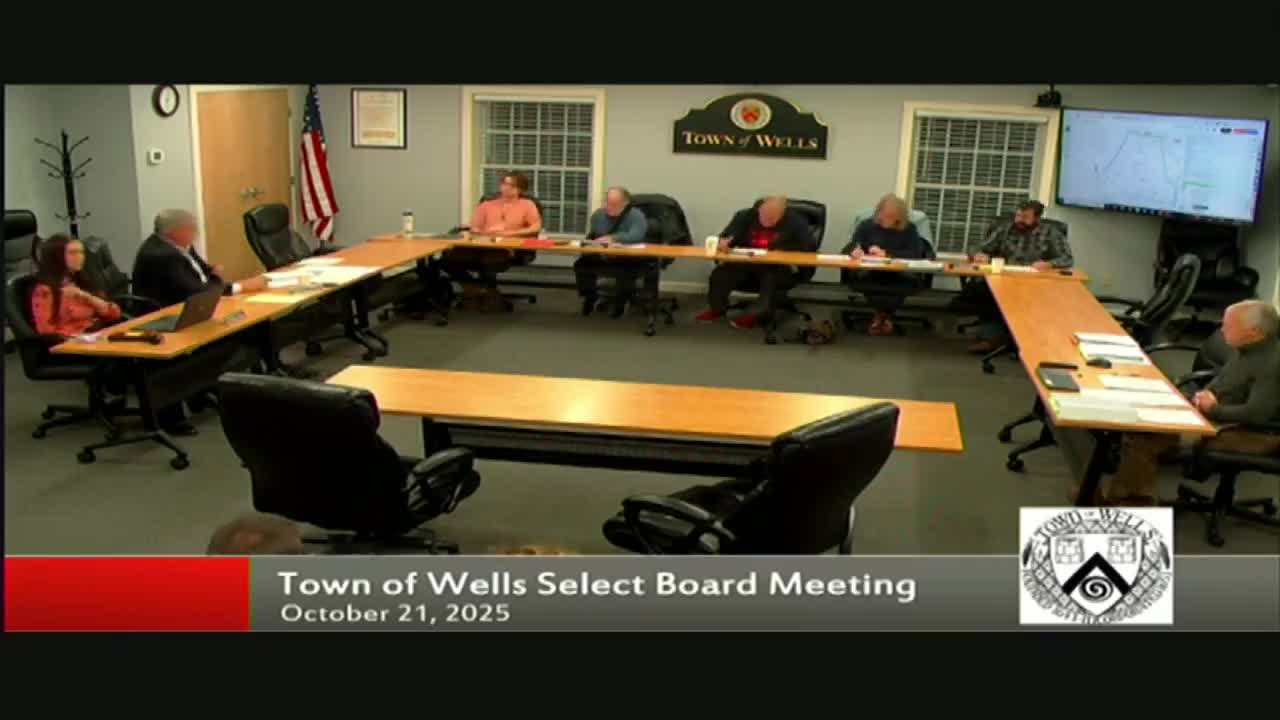Selectmen hold public hearing on multiple referendum items ahead of 11/4 ballot
Get AI-powered insights, summaries, and transcripts
Subscribe
Summary
At a public hearing, the Wells Board of Selectmen reviewed several referendum articles to be decided by secret ballot Nov. 4, including a comprehensive plan update, a change to the town clerk position, accessory dwelling unit and affordable-housing ordinance changes, sidewalk expansion, and a boundary-line agreement for a conservation parcel.
The Wells Board of Selectmen held a public hearing Oct. 21 on the referendum articles that will be decided by secret ballot on Nov. 4, reviewing a package that includes a comprehensive plan update, a proposal to change the town clerk from an elected to an appointed position, amendments to the accessory dwelling unit (ADU) and affordable housing ordinances, an expanded sidewalk requirement, and a boundary-line agreement for a conservation parcel.
Town Manager Mike Pardue summarized the items and timelines and told the board the comprehensive plan update committee began its work after an ordinance established it in February 2019. He said the draft plan has been published and is available online and at town offices and the library.
During the hearing, longtime resident Joe Hardy urged voters to reject the comprehensive plan update, saying the committee’s membership and the plan’s content do not represent the town and that the update “does not mention greenhouse gas emissions nor set any goals for reducing those emissions.” Hardy named two committee members who, in his view, acknowledged a climate crisis: “No 1 else thought we had a climate crisis.” He urged voters to vote No and offered to help rewrite the plan.
On the question of changing the town clerk from an elected to an appointed position, Pardue reviewed the chronology: the ballot question was first presented in June 2023, failed to meet a 30% turnout threshold then, was placed on the November 2023 ballot and failed, and the board appointed Marybeth Pordon to the clerk’s position when Brenda Layman retired. A member of the public, identifying herself as Peggy Eddy and a Wells resident, said she opposed moving to an appointed position and emphasized the value of electing town officials; the meeting record also notes that Brenda Layman and her sister Jessica have publicly supported changing to an appointed clerk, saying the job’s complexity supports appointment.
Article 4, a revision to the ADU ordinance prompted by state law LD 2003, would allow ADUs on previously nonconforming lots, permit detached ADUs, increase the allowed size from 600 to 800 square feet, and require a minimum lease period of six months. Cheryl Mills, a resident, said she supports the six-month minimum to discourage conversion of ADUs into short-term rentals; another resident, Scott DeFeliz, urged restricting where ADUs could be allowed, saying concentrations on Route 1 could exacerbate traffic and short-term rental pressures.
Article 5 would adjust the town’s affordable-housing ordinance (previously limited to RA zones) to allow developments in RA, RC and GB zones and to increase a density bonus from two times base density to 2.5 times. Article 6 would expand the town’s sidewalk overlay district to all of Route 1, Chapel Road and College Drive and allow concrete sidewalks instead of pavers, and would remove the sidewalk development fund option.
Article 7 would authorize a boundary-line agreement concerning the Tilton Conservation parcel adjacent to the Great Heath and the Maryland River. Town staff said surveys dating from the town’s 2013 purchase and a more recent survey found deed descriptions to be indeterminate and recommended a boundary-line agreement that “splits the difference” where deed lines are unclear; because it changes a town property line it is a referendum item.
The public hearing was formally closed by motion at the end of the remarks; the board then discussed the items but took no further board-level actions that would alter ballot placement. The selectmen noted that changes required by state law (LD 2003) limit the town’s discretion on some ordinance language.
Voters will decide the listed referendum articles by secret ballot on Nov. 4. The town clerk’s office and town manager’s office have the published comprehensive plan and text of the proposed ordinances on file for public review.
